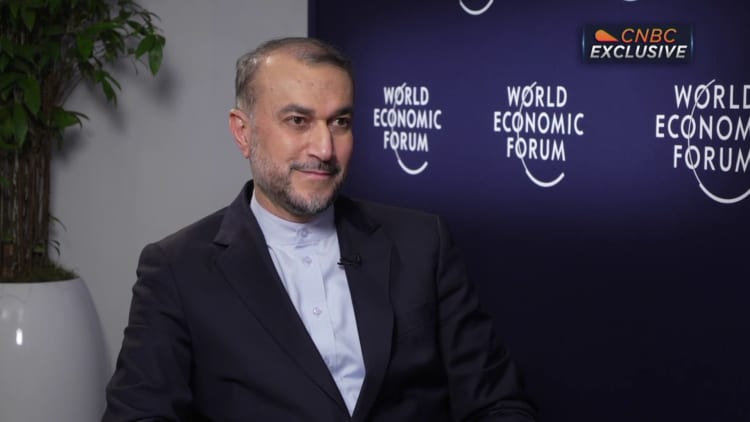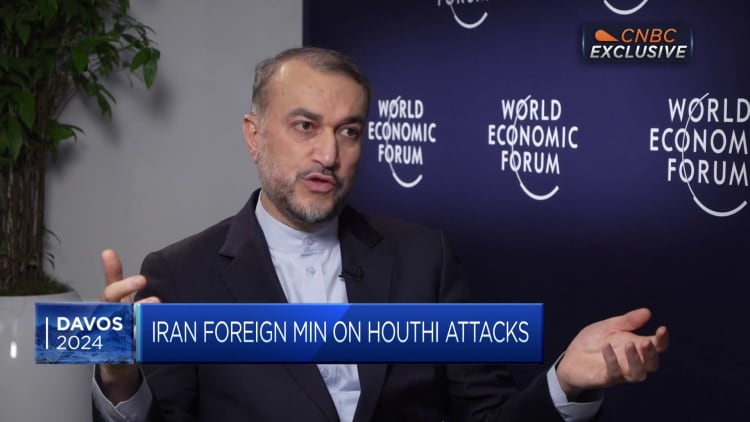
DUBAI, United Arab Emirates — Within 24 hours, Iran launched missile and drone strikes on targets in three countries — Iraq, Syria and Pakistan — and took the extraordinary step of announcing its responsibility for the attacks, triggering anger from its neighbors.
The developments have heightened concerns over the possibility of a wider Middle East conflict, as the Israel-Hamas war and daily Israeli bombardment of the Gaza enclave passes the 100-day mark.
Baghdad recalled its ambassador to Iran after the Monday night attack on its northern semi-autonomous Kurdistan region killed four civilians and injured at least six. Tehran said the strike targeted an Israeli spy hub near the U.S. consulate in Erbil, the Kurdistan regional capital city. Iraqi Kurdish Prime Minister Masrour Barzani rejected the Iranian claim, describing the attack as a “crime against the Kurdish people.”
Iraq’s Foreign Ministry, meanwhile, called the attacks a “violation of international law” and said it would file a complaint with the U.N. Security Council. France’s Foreign Ministry said in a statement that Iran was “contributing to the escalation of regional tensions — and it must stop.”
Speaking to CNBC at the World Economic Forum in Davos, Switzerland, on Tuesday night, Iranian Foreign Minister Hossein Amirabdollahian defended his country’s actions.
The Iranian forces’ strikes were “in line with combating terrorism and legitimate self-defense,” the minister said, adding, “We have no reservations when it comes to securing our national interest with any other country.”
A civil defence team carries out search and rescue operations in a damaged building following a missile strike launched by Iran’s Revolutionary Guard Corps (IRGC) on the Kurdistan region’s capital of Arbil, on January 17, 2024.
Safin Hamid | AFP | Getty Images
Tehran also hit what it said were Islamic State targets in northern Syria in tandem with its strikes on Iraq. It then went on to target the headquarters of a Sunni armed group in Pakistan’s western Balochistan province near the Iranian border.
Pakistan’s Foreign Ministry said Tuesday that it “strongly condemns the unprovoked violation of its airspace by Iran” which it said killed two children and injured three more. It added that “it is even more concerning that this illegal act has taken place despite the existence of several channels of communication between Pakistan and Iran.”
While the attacks on Syria and Pakistan were not related to Israel — Tehran said the strikes were targeting anti-Iran terror groups — they signify bolder direct action from Iran, which funds and supplies forces opposing Israel like Hezbollah in Lebanon, Hamas in Gaza and the Houthis in Yemen.
Iran presents its first hypersonic ballistic missile ‘Fattah’ (Conqueror) in an event attended by President Ebrahim Raisi and other government officials in Tehran, Iran on June 06, 2023.
Sepah News | Anadolu Agency | Getty Images
“This shows that Iran will not stop now from targeting such groups across its eastern border and will use missiles and drones,” Umar Karim, an associate fellow at the King Faisal Center for Research and Islamic Studies, told Middle East news outlet Al-Monitor, referring to the Pakistan strikes.
The boldness of the attacks, he said, suggests that “Iran can be expected to go against these militant groups … in the future.”
‘Isolated’ Iran
Yemen’s Houthi militia group in recent weeks has launched dozens of attacks on commercial ships in the Red Sea in protest against what it says is Israel’s genocide of the people of the Gaza Strip.
According to Palestinian health authorities, more than 24,000 people in the besieged enclave have been killed under Israeli bombardment since Oct. 7, when Hamas killed 1,200 people in a terror attack in southern Israel. Mass starvation and disease in the Gaza Strip are now as much of a threat to life as the daily Israeli bombings, international aid groups warn.
In response to the Red Sea attacks, the U.S. and U.K. governments last week began launching missile strikes against Houthi positions in Yemen. While the U.S. has hit Iranian proxies in Syria and Iraq since the Gaza war began, the missile strikes marked the first U.S. attack on the Yemeni group. Iran’s foreign minister told CNBC on Tuesday that the Houthis “are not receiving any orders or instructions from us.”

U.S. Secretary of State Antony Blinken has stressed the need for negotiations toward a Palestinian state once the war ends, arguing that it would not only improve chances for peace in the region, but also disempower Iran.
“When you put together integration in the region, Israel’s normalization of relations with every country, security assurances and commitments, a Palestinian state … you’ve created an entirely new region. And then Israel’s biggest challenge, biggest problem, for us as well — Iran — is isolated,” Blinken told CNBC on Tuesday in Davos.
“It answers that problem very powerfully as well. Now, Israel, in this moment, of course, is focused on Gaza. It’s focused on Oct. 7,” he said. “But when that ends, they have to make fundamental decisions about their future. These are hard decisions.”
Don’t miss these stories from CNBC PRO:
Read More: World News | Entertainment News | Celeb News
CNBC










